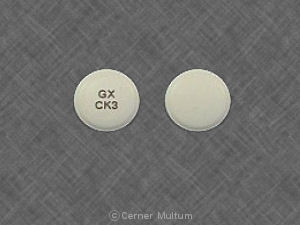Grepafloxacin Disease Interactions
There are 4 disease interactions with grepafloxacin.
Quinolones (applies to grepafloxacin) CNS disorders
Major Potential Hazard, Moderate plausibility.
Quinolones may cause CNS stimulation manifested as tremors, agitation, restlessness, anxiety, confusion, hallucinations, paranoia, insomnia, toxic psychosis, and/or seizures. Benign intracranial hypertension has also been reported. Therapy with quinolones should be administered cautiously in patients with or predisposed to seizures or other CNS abnormalities. In addition, these patients should be advised to avoid the consumption of caffeine-containing products during therapy with some quinolones, most notably ciprofloxacin, enoxacin, and cinoxacin, since these agents can substantially reduce the clearance of caffeine and other methylxanthines, potentially resulting in severe CNS reactions.
Quinolones (applies to grepafloxacin) myasthenia gravis
Major Potential Hazard, Moderate plausibility.
Fluoroquinolones have neuromuscular blocking activity and may exacerbate muscle weakness in persons with myasthenia gravis. Postmarketing serious adverse events, including deaths and requirement for ventilatory support, have been associated with fluoroquinolones use in persons with myasthenia gravis. Fluoroquinolones should be avoided in patients with history of myasthenia gravis.
Quinolones (applies to grepafloxacin) peripheral neuropathy
Major Potential Hazard, Moderate plausibility.
The use of quinolones has been associated with an increased risk of peripheral neuropathy. Monitor closely and discontinue their use in patients experiencing symptoms of peripheral neuropathy. It is recommended to avoid these agents in patients who have previously experienced peripheral neuropathy.
Quinolones (applies to grepafloxacin) tendonitis
Major Potential Hazard, Moderate plausibility. Applicable conditions: Rheumatoid Arthritis, Renal Dysfunction, Organ Transplant
Tendonitis and ruptures of the shoulder, hand, and Achilles tendons have been reported in patients receiving quinolones, both during and after treatment. Avoid the use of these agents in patients who have a history of tendon disorders or have experienced tendinitis or tendon rupture. Therapy with quinolones should be administered cautiously in patients with patients with kidney, heart, and lung transplant, since it may delay the recognition or confound the diagnosis of a quinolone-induced musculoskeletal effect. Factors that may independently increase the risk of tendon rupture include strenuous physical activity, renal failure, and previous tendon disorders such as rheumatoid arthritis. It is recommended to discontinue these agents if, at any time during therapy, pain, inflammation or rupture of a tendon develops and institute appropriate treatment.
Switch to professional interaction data
Grepafloxacin drug interactions
There are 664 drug interactions with grepafloxacin.
Grepafloxacin alcohol/food interactions
There are 2 alcohol/food interactions with grepafloxacin.
More about grepafloxacin
- Check interactions
- Compare alternatives
- Side effects
- During pregnancy
- Drug class: quinolones and fluoroquinolones
Related treatment guides
Drug Interaction Classification
| Highly clinically significant. Avoid combinations; the risk of the interaction outweighs the benefit. | |
| Moderately clinically significant. Usually avoid combinations; use it only under special circumstances. | |
| Minimally clinically significant. Minimize risk; assess risk and consider an alternative drug, take steps to circumvent the interaction risk and/or institute a monitoring plan. | |
| No interaction information available. |
See also:
Further information
Always consult your healthcare provider to ensure the information displayed on this page applies to your personal circumstances.


